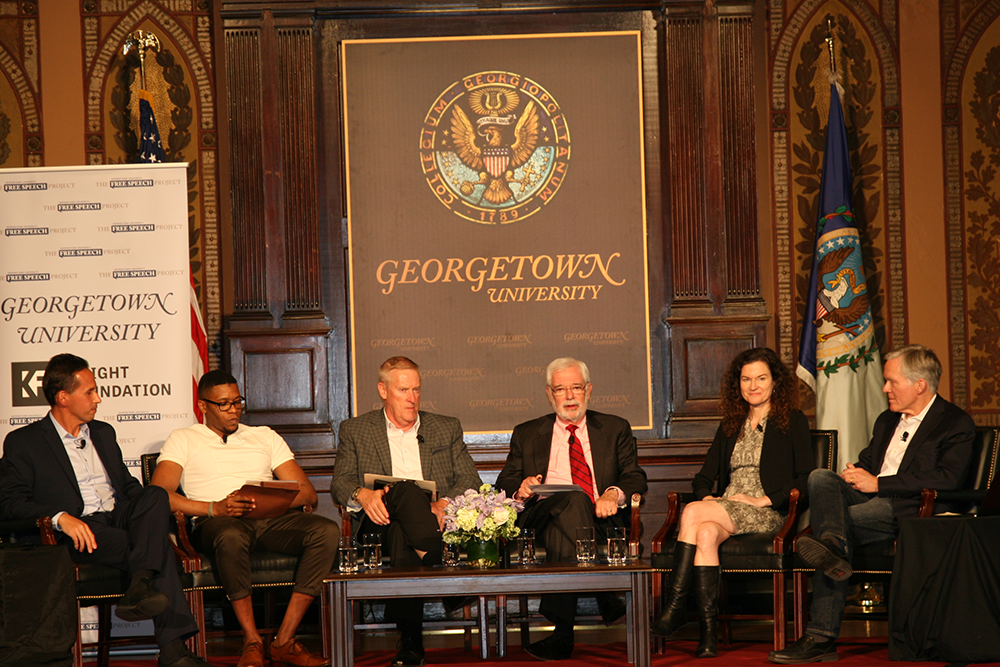Fostering connections between incarcerated people and the outside world must be a key feature of criminal justice reform, panelists agreed at a discussion on the free speech rights of incarcerated Americans on Tuesday.
The event, co-sponsored by the Georgetown Prisons and Justice Initiative and Georgetown’s Free Speech Project, was titled “Inside Voices: The Free Speech Rights of Incarcerated Americans” and moderated by Marc Howard, a government professor and the director of the Prisons and Justice Initiative, and Sanford Ungar, director of the Free Speech Project.

Present on the panel was Joel Castón, a participant in Georgetown’s Prison Scholars Program through the Prisons and Justice Initiative. Castón has been incarcerated for nearly 25 years and has been studying under Marc Howard through the Prison Scholars Program.
Dialogue between incarcerated residents and policymakers is crucial in ensuring the rights of those who are detained, Castón told Tuesday’s audience via Skype from the D.C. jail.
“We must be able to know that our voices are not only being heard, but our perspectives are being taken under consideration, and it’s a two-way dialogue that ebbs and flows,” Castón said. “These things right here will help with safety in the prison.”
Castón mentors younger residents in the D.C. Jail through “Young Men Emerging,” a program he founded which pairs inmates typically serving life sentences with incarcerated men between the ages of 18 and 24.
The connections that YME helps create are crucial in making the transition from incarceration to the outside world successful, according to Howard.
“If you are engaged, if you are connected, as he was, as Joel is, you are ready,” Howard said. “If you are separated, if you are cut off, if you have no voice, if you have no opportunity, no technology from society, it’s going to be very, very hard.”
The Prisons and Justice Initiative has seen multiple success stories with its participants recently. Halim Flowers, a participant in the Prison Scholars program and imprisoned at 17, was released early from jail March 21 after 22 years in prison as a result of his personal growth while incarcerated. “Making An Exoneree,” a Georgetown course offered by Howard, has also worked to exonerate wrongfully convicted individuals in the past including Valentino Dixon, who spent 26 years in prison after being found guilty of murder.
Another member of the panel was Sekwan Merritt, a paralegal for Arnold and Porter who was formerly incarcerated. Merritt was sentenced to 25 years in prison for intent to distribute 2.4 grams of heroin in 2012. Through his own research, he discovered a Supreme Court case, Lafler v. Cooper, that invalidated his sentence in 2016.
While in prison, Merritt was temporarily moved to solitary confinement in 2015 after asking to post an image with a quote he read in a book in the prison library, he shared on Tuesday’s panel. Merritt had not yet posted the quote when he was detained by five officers, moved to solitary confinement and told that he was attempting to incite a riot.
The free speech rights of incarcerated Americans should not be unrightfully restricted by the corrections system, according to Merritt.
“So when we speak about people incarcerated being able to write or, as I said, just at the minimal level, just even be able to think of change, it can be stopped at any given moment with the excuse that you’re trying to incite a population against the overregulation of the truth,” Merritt said.
In most prisons, incarcerated Americans are never briefed on the rights they have during their sentences, according to panelist Amy Fettig, deputy director of the ACLU Prisons Project.
“We should be doing everything we can to make sure that people who are incarcerated are as close to the population on the outside as possible,” Fettig said.
In most prisons, incarcerated Americans are never briefed on the rights they have during their sentences, and increased accessibility to incarcerated citizens could help protect their rights, according to Fettig.
“We should be doing everything we can to make sure that people who are incarcerated are as close to the population on the outside as possible,” Fettig said.
Free speech rights also include voting rights, which are almost universally denied to incarcerated Americans against international norms, according to Howard.
“The U.S. is actually exceptional in denying people the right to vote while they are incarcerated, and it is completely exceptional beyond every measure in denying 6 million people the right to vote, and this is state-by-state, after they have served their time,” Howard said.
Today, Maine and Vermont are the only two states where felons maintain the right to vote during their sentences. Incarcerated Americans have a strong desire to be involved in the political process, according to Castón.
The perception of incarcerated people as active citizens is crucial in the reform process, Castón said.
“I think that the way we excel is when you see us as concrete people, whether we are detained or incarcerated, you see us as a person, you see us as a human being, and I think that’s tied directly to the voting rights,” Castón said. “That we are still citizens, we just happen to be currently incarcerated, so our voices matter, our opinions matter.”




















